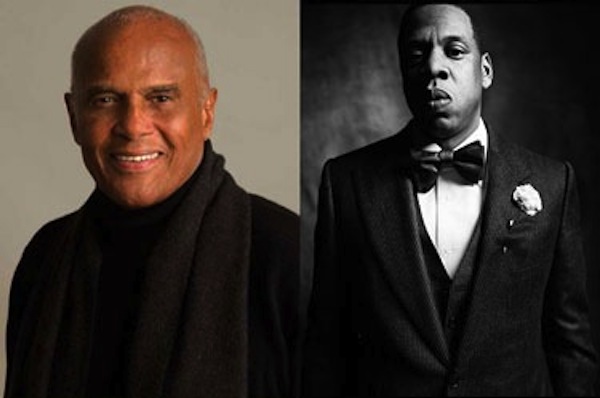Jay Z has made a career of speaking his mind. But the ongoing controversy over recent remarks about his presence being “charity” seems to have touched a nerve with many people. Academics, pundits and bloggers are mostly in agreement that Jay Z at best misspoke and at worst is an arrogant fool. I don’t agree with either position. As I see it, there are three main issues at play here: 1) generation gaps, 2) expectations for celebrity advocacy, and 3) racism.
Let’s start with the generation gap between Jay Z and Harry Belafonte. Jay Z is 43. Belafonte is twice his age: 86. The world into which Belafonte was born is in many respects unrecognizable to someone like Jay Z, who came of age in a post-civil rights America. Even more striking is the gap between Belafonte’s generation and the millennials (the people who listen to and care most about Jay Z). Here’s why understanding this gap proves so important to understanding this controversy. As a university professor I have witnessed first-hand the ways that young people do or do not engage race. Those who have attacked Jay Z for believing in a “post-racial” America have misunderstood the millennials’ position on race. As my students tell me, it’s not that race doesn’t matter; it’s that race should not matter and therefore they do not let racial thinking stop them from doing what they want to do, personally or professionally. So, when Jay Z says that young people don’t do race the way older people do or that we have come a long way since the 1960s, he is correctly noting a social shift. But just because millennials (or Jay Z) celebrate how far we have come does not mean that they are unaware of the many existing challenges. Even as individual black people are able to achieve success, inequalities evidenced in policies such as “Stop & Frisk” and violence against black people such as the killing of Trayvon Martin demonstrate how far we have to go.

Which brings me to my second point: What is the responsibility of successful black people to the communities out of which they come? Must they, as the saying goes, “lift as they climb” and help those less fortunate? According to Forbes, Jay Z has a net worth of approximately $500 million, which makes Mr. Shawn Carter second only to Mr. Sean Combs (AKA Diddy) as one of the world’s richest rappers. According to Belafonte and others, Jay Z’s wealth and celebrity require him to demonstrate “social responsibility.” In fact, his success is not conditional and he isn’t beholden to use his power charitably or politically. Yet he does so anyway. He recently gave $3.6 million in bonuses to his employees. According to BlackGivesBack.com Jay Z has a scholarship fund, has donated to the American Red Cross, given money to rebuilding efforts for post-Hurricane Katrina New Orleans, and to other causes. Lest we forget, he also helped Obama get re-elected. So, before we criticize Jay Z, we should consider how he does give back and assists others committed to social responsibility.
This brings us to the third issue. Racism. It’s part and parcel of all the attacks on Jay Z in recent days. As Jay Z himself said recently on Bill Maher, he has the audacity to be great, unapologetic…and black. Historically, successful black people have been told to tread a thin line. Be successful but not too successful. Be proud but humble. In light of this so-called advice, Jay Z’s “my presence is charity” comment is really saying, “I know my worth. And so do you – if you had the money, you’d pay to be in a room with me.” This brand of bold honestly makes some people mad. They’re mad that a former (alleged) drug dealer now has $500 million and the ear of the POTUS. Yet Jay Z did not misspeak and he has no reason to apologize. As the old saying goes, Jay Z “puts bottoms in seats.” And those bottoms are attached to people with big check books who will make donations because Jay Z was in the room.
We should thank Belafonte and his compatriots for their commitment and service. They helped create a nation where a Jay Z can succeed. But gratitude does not mean later generations must do things exactly as their forebears. It’s clear that Jay Z is unlikely to stage a sit-in or lead a march. However, throwing his considerable support behind political candidates, donating to selected charitable organizations, and showing up at events to help others change the world – these are all forms of charity. After all, he doesn’t have to do any of these things. Mr. Shawn Carter gives back in the most appropriate way – by being Jay Z.
Ulli K. Ryder, Ph.D., is an award-winning scholar interested in racial and gender identities, media representation and visual art of all kinds. She is a full time faculty member at Simmons College and Visiting Scholar at Brown University.
